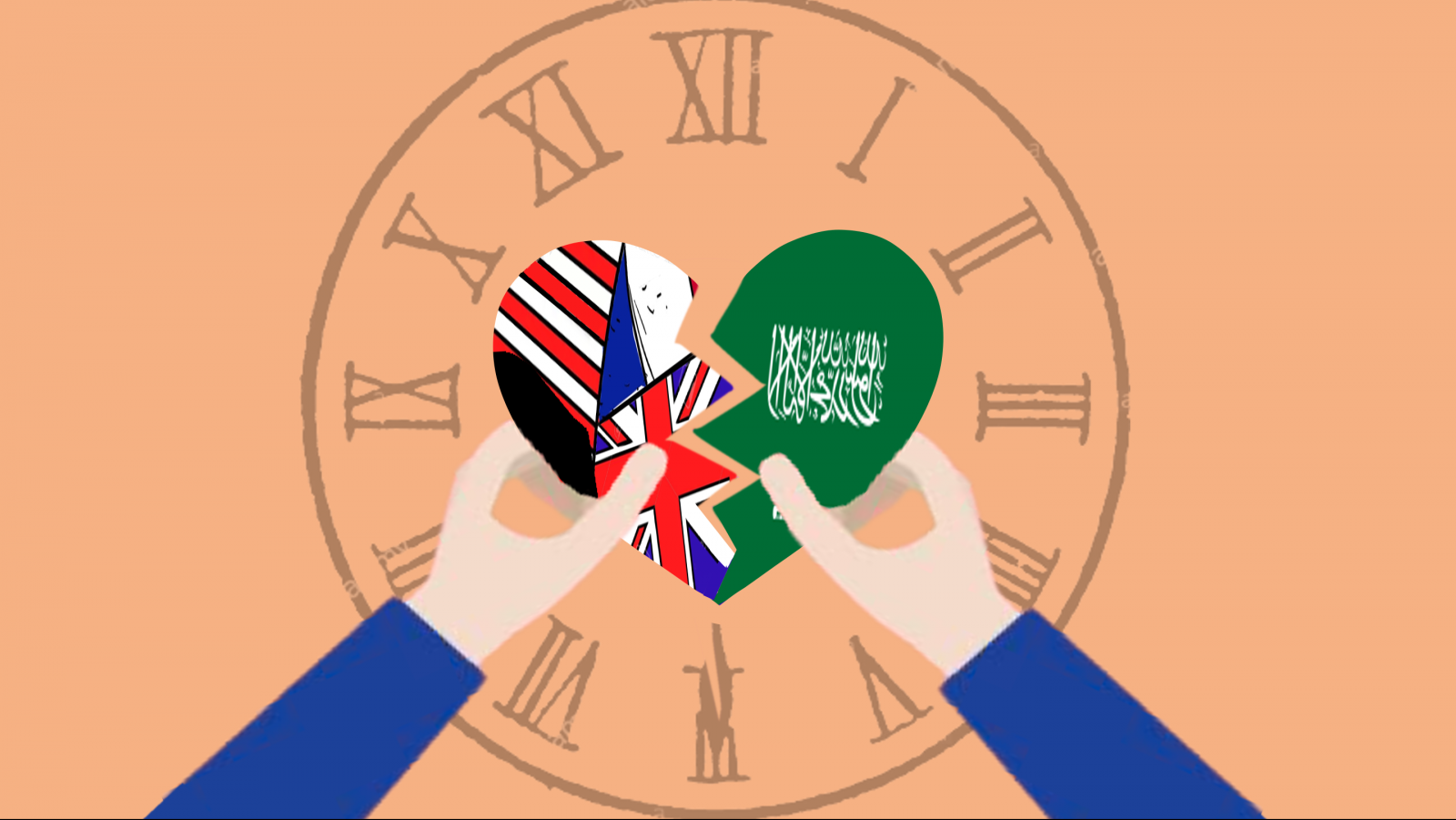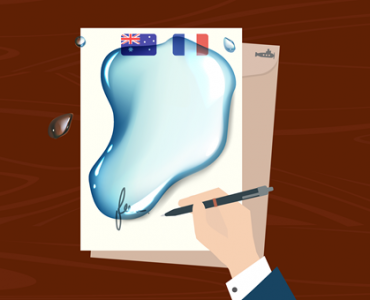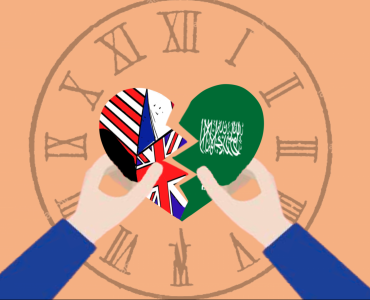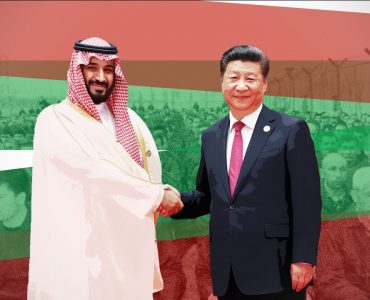In March 2018, American president Donald Trump declared that he had a “great friendship” with Saudi Arabia’s crown prince Mohammed bin Salman, also known as MBS, who was then visiting him in Washington. The American billionaire, with his well-known tendency to hyperbole, even considered that the Saudi-American relationship had “never been better”. A month later, French president Emmanuel Macron welcomed MBS in Paris, although the two men had had tense discussions during their last meeting at the end of 2017, about the alleged sequestration of Lebanese prime minister Saad Hariri in Riyadh. Was a cold handshake to be expected? On the contrary, the two statesmen shared a warm embrace and even kissed each other’s cheeks.
Up until very recently, the West had been making eyes at Mohammed bin Salman, who has been the real strongman in the Gulf since he was appointed crown prince by king Salman bin Abdulaziz Al-Saud in June 2017. Aged only 35, he embodies the beginning of an era of modernity in the kingdom, and an ambition to make it the main regional power, in order to weigh in the global balance of power. In other words, MBS aspires to make Saudi Arabia great again. The crown prince also shows the Saudi people a reformist face: allowing women to drive in 2017 was a major step forward in one of the countries where gender equality is the least observed in the world. This progressist varnish was very much liked by Western countries: Emmanuel Macron publicly complimented MBS about it when they met in April 2018: “You have done a lot for women in your country.”
However, behind this illusion of humanism, the Saudi crown prince seems to be just as violent as his predecessors. Given the Khashoggi case, the war in Yemen, the purge in his own family and the repression of dissident populations, MBS may be even worse. The Western countries have turned a blind eye on Saudi authoritarianism for more than a hundred years, why should it change, you may ask?
In order to understand why the idyll endured until recently, and why a divorce is conceivable, one has to reflect on a century of friendship between the West and the Saudi kingdom, and analyze the current situation.
A century-old marriage
The relationship between Saudi Arabia and the West is so strong and lasting for it started over a century ago, before the Saudi kingdom was even a country. The British Empire was the first to build a relationship of trust with the future first king of Saudi Arabia, Abdulaziz Ibn Saud. At the beginning of World War I, the British signed a treaty with Ibn Saud, whereby they engaged themselves to protect his territories in exchange for his faithfulness to the Allies. They didn’t hesitate to multiply financial aid to Ibn Saud during his conquest of the different territories of the Arabian peninsula at the beginning of the 1920s. In 1930, Ibn Saud made peace with Faisal, the king of Iraq, onboard a British ship and two years later, he proclaimed his kingdom, which he named Saudi Arabia after himself.
In the 1930s, as the Middle East came to be seen as the new oil Eldorado, Saudi Arabia attracted a new Western power, one that had to be accounted for. Although the huge Saudi oil reserves had not yet been discovered, the Standard Oil Company saw it coming and signed an agreement with king Ibn Saud as early as 1933, which allowed it to make oil explorations on the royal territory. It was a winning bet: during the drillings, Americans progressively discovered, amazed, the world’s biggest oil reserves. But the real marriage between Saudi Arabia and the United States was celebrated onboard the USS Quincy, where American president Franklin D. Roosevelt signed a well-known pact with Ibn Saud, which guaranteed Saudi Arabia the American protection in exchange for a privileged access to the tantalizing royal black gold for the American majors. 75 years of marriage, and almost no fight! The Saudi-American love even tended to get stronger and stronger: Saudi Arabia was used as a military base for the deployment of hundreds of thousands of American soldiers during the 1991 Gulf war, which made it an even more crucial partner for the US, and a pivot in the geopolitics of oil – as this podcast argues.
Besides the oil shocks of 1973 and 1979, the alleged Saudi funding of Islamist terrorism after 9/11 gave rise to tensions, especially as fifteen out of the nineteen terrorist pilots involved in the attacks were Saudi Arabian. In the wake of this polemic, Barack Obama’s election in 2008 made things even worse. The American president distanced himself from the biggest country in the Persian Gulf, and the 2015 nuclear deal that he made with Iran, the Saudis’ sworn enemy, enraged king Salman bin Abdulaziz Al-Saud. Although the Saudi-American idyll really seemed threatened, the couple regained a rarely-known stability with Donald Trump’s election. By choosing Riyadh for his first official trip as president in May 2017, he reaffirmed the American trust in Saudi Arabia, which had been slightly damaged. Besides, he did not hesitate to stage his very cordial relationship with the crown prince.
While Saudi Arabia has a “special” relationship with the United States, and to a lesser extent with the United Kingdom, the other Western countries have also had tight political and economic ties to the kingdom since World War II. The reason for this is the irresistible appeal of the abundant, high-quality Saudi oil. European countries developed bilateral partnerships with the Saudis. Let us consider France. From the 1960s onwards, it built a strong cooperation with the peninsular State. While a technical and cultural treaty in 1963 laid the foundations for it, exchanges developed mostly in the business sector. In 1973, Saudi Arabia became France’s first source of oil, and it remains so in 2021. As a counterpart, France has been exporting mostly military material to the kingdom since 1965. These sales have been notably increasing for several decades, to the point of reaching outrageous amounts: between 2008 and 2017, the Saudis have ordered 11 million euros worth of weapons from France.
MBS’s comings and goings are no longer accepted
The idyll between Saudi Arabia and the West has stood the test of time, despite a few fights. In 2017, exchanges were in full bloom: Saudi oil was cheap after a strong fall in prices, Donald Trump gave the kingdom strong certitudes about the American support so precious to the regime, Saudi Arabia bought numerous weapons in return… The calm before the storm.
Mohammed bin Salman, newly chosen by king Salman bin Abdulaziz Al-Saud to succeed him on the throne, embodies renewal in the eyes of Westerners. Even though he was not the official crown prince yet, MBS gave strong hopes to Westerners when he presented his plan “Vision 2030” in April 2016, which aimed at getting the country out of its oil rent by diversifying its activities and developing the private sector. “We live in a modern society, where it is difficult not to be transparent and where it is difficult to hide a secret. It is very important that we give information to everybody, including citizens, the private as well as the public sector, so that they can take part in the dialogue in our country.”
In order to give himself the means to realize his ambitions bursting with modernity, MBS launched the titanic project “Neom” on the side: the construction of a futuristic town which would be “250 times the size of Paris”, at the cutting edge of global technology and with looser morals than in the rest of the country (alcohol would be allowed). While the Saudi people are full of hope, Westerners are over the moon! The promise of a progressive Saudi Arabia which aims at looking like them is a relief after the tensions of the last two decades. A promise that is too good to be true…
A view of Neom as envisaged by MBS at the beginning of the project
Waking up to reality from this sweet dream was harsh for the West. The first hitch was the Saad Hariri case. In November 2017, the Lebanese prime minister surprised the international community by announcing his resignation while he was in Saudi Arabia. In December, the New York Times made the case that he had been forced by MBS to quit, in order to put pressure on Hezbollah, the very influential Shiite political party in Lebanon that has strong ties to the great Iranian enemy. While France and its president Emmanuel Macron managed to solve the crisis quickly by negotiating Saad Hariri’s exfiltration and his return to office, the way Westerners look at MBS is no longer the same, and hope was replaced with distrust.
This distrust was justified, since on October 2, 2018, Jamal Khashoggi, a Washington Post journalist and dissident to the Saudi regime, was killed in the Saudi consulate in Istanbul. In the face of the indignation of the international community, everything was done to make MBS look innocent in this case, as he had naturally been suspected of orchestrating this murder. Eight people were accused of murdering Khashoggi and five of them were sentenced to death. But would you believe it! The journalist’s family forgave the murderers and their sentences were overruled by the Saudi courts in September 2020. A “joke” and a “travesty of justice” according to the UN’s special reporter Agnès Callamard. Paradoxically, the political and commercial relations between Saudi Arabia and the West were not too hurt by this abominable case. While all Western countries accused the regime and imposed sanctions on the people allegedly involved in the case, few decided to impose sanctions on the Saudi regime. Only Germany tried to impose an embargo on arms sales to the kingdom, France and the United States did not follow. In the end, MBS hurt his image and raised suspicions, but he succeeded. The idyll was damaged but it did not end.
MBS blinded the West by giving the illusion of being a leader prone to reform Saudi Arabia with social progress and dazzling projects. But what he truly wants is to exert power, to enforce law and order. And he gets rid of anything that could undermine his power. A telling example is the purge he conducted in his own family, in March 2020, when he had four high-rank princes arrested, including his uncle Ahmed bin Abdulaziz, who had criticized his involvement in the war in Yemen. MBS ignored the Western backlash, particularly that of England, where his uncle lived. He knows the appeal of oil is too strong, he is convinced he will be forgiven whatever atrocities he commits, because the political and economic partnership that links him with Western countries is too important for them. But while the crown prince thinks he is in a position of power, the future may prove him wrong.
Joe Biden, the short straw for MBS
On November 7, 2020, Riyadh was astonished. After a vote whose counting lasted several days, most of the American media announced that Joe Biden had defeated incumbent president Donald Trump. The latter contested the results and denounced massive election tampering. Saudi Arabia, although it would have hoped for a situation reversal in favor of the one who had cherished it during his term, ended up congratulating Biden the next day. On this occasion, MBS declared he “aspired to keep up the joint collaboration between the two friend countries.” Behind this friendly discourse, Joe Biden’s arrival is a thunderclap for MBS, which could well endanger the century-old Saudi-American idyll. Saudi Arabia expects the worst from the election of a candidate who did not hesitate to promise to forbid American arms sales to the kingdom, in order to treat it like “the pariah it is”. And this fear is justified.
While Biden was often mocked by Donald Trump for his softness and his lack of energy during the presidential campaign, he actually appeared surprisingly firm during his first contact with the kingdom of the Arabian Peninsula. When he first exchanged with the Saudi authorities at the end of February, a few weeks after his inauguration, he declared he wanted to “recalibrate” his relations with the kingdom. How can one interpret this declaration, you may ask? First, by “recalibrate”, Biden means addressing the accredited people. US presidential spokesman Jean Psaki explained: “the president’s counterpart is king Salman and he will talk to him when the time has come.” By choosing king Salman as his official Saudi interlocutor, he knocked MBS off his pedestal. Besides, according to Emma Soubrier, a researcher at the Arab Gulf States Institute in Washington, the new American president wants to put an end to relations with Saudi Arabia that were “based on interpersonal relationships” under the Trump administration. This is meant to make MBS understand that his delusions of almighty power have a limit. Furthermore, the promised release of a CIA report on MBS’s potential involvement in Jamal Khashoggi’s murder in 2018, which had been classified under Trump, was to be a new strong blow for the crown prince.
And a strong blow it was, when the said report was published a few days later. The investigation conducted by the CIA after Jamal Khashoggi’s murder in Istanbul led to the conclusion that MBS had approved this operation. Besides from being sidelined, MBS was found to be fully involved in the dissident journalist’s murder. He who saw himself as almighty and who thought he would come out of this case unscathed, found himself strongly weakened. While the release of the report did not give rise to any significant sanction, it injured the friendship between Saudi Arabia and the United States, as the former saw its leader accused by the latter of having approved a shameful murder.
Firmness versus seduction
Joe Biden’s firmness towards Saudi Arabia and the weakening it creates show that the kingdom is no longer in a position of strength and that the idyll is threatened whenever the West raises its voice. All the more so since oil, which was the main interest of a strong partnership for the West, is less and less of an asset for the regime. Indeed, while Trump developed a strong friendship with MBS, he also strongly relaunched the American production of shale oil, so that the US became the world’s first oil producer in 2019, before Saudi Arabia. Even though the US still needs the Saudi oil because it is not fully energy-independent yet, exploiting the kingdom’s oil is less of a critical necessity than it used to be, and tends to be less and less so.
Even though the rest of the West keeps exploiting Saudi oil, the repetitive scandals of the kingdom place it under the threat of heavy sanctions in case of a new crisis. Saudi oil is not vital anyway, there are other producers. The situation is therefore uncomfortable for MBS and, faced with a threatened idyll, he tries to play the seduction card.
The first piece of news that was supposed to thrill the West, and especially the historic American ally, was the resuming of relations with Israel. At the end of November 2020, a few weeks after Joe Biden’s victory in the American presidential election, MBS secretly met Israeli prime minister Benjamin Netanyahu in Neom, in the company of former American secretary of State Mike Pompeo. The normalization of relations between the two countries is still being debated within the kingdom and is not on the agenda yet, but a meeting between the two statesmen is an exceptional event and a major step forward, which does not fail to delight the American ally.
MBS is ready to do anything to win the American heart back and he keeps up his seduction operation. At the beginning of January, he put an end to a 3-year-and-a-half embargo on Qatar, another emerging power in the Gulf whose collusion with Iran he had strongly disliked. After criticizing him for this embargo, Westerners congratulated him for making a fresh start.
MBS welcoming emir of Qatar Tamim bin Hamad Al Thani
The crown prince even did something no one would have hoped he would do: he resumed contact with his country’s sworn enemy, Iran. On April 23, 2021, Saudi Arabia opened negotiations with Iran to appease the tensions between the two countries, after five years of diplomatic rupture. It was another way to appeal to Biden’s sympathy, who had not hidden his will to renegotiate the nuclear deal with Iran that Trump had left in tatters.
These efforts Saudi Arabia made in order to restore its image in the eyes of the West show that it is in a position of weakness. MBS knows that the idyll could end with the next case in which his government is suspected of being involved. He is conscious that he is no longer in a position of strength and that he sometimes needs to make choices against his will in order to reassure Westerners, especially the US, led by a Biden much more hostile to him than Trump was. Thus, the kingdom still holds the key to a long-lasting idyll with the West. It is up to MBS to make good use of it.











